146th Engineer Combat Bn. First Army "V Corps"
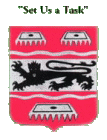
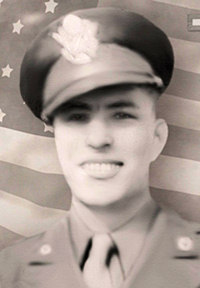 My Personal Experience in the Battle of Vossenack
My Personal Experience in the Battle of Vossenack
My partner and I were using a bomb crater as a fox hole. Any shelter at this point was a blessing. The 88's (Germany's best artillery) were targeted to flatten the houses to our left. The accuracy was incredible. Apparently they had zeroed in this area from previous shelling of the Infantry from the 28th (Bloody Bucket) Division.
My body was folded a fetal position cramming down my helmet, praying that I could hide my entire body into it....A silent prayer passed my lips as I huddled close to the loose earth. 1 - 2 - 3 up to 10, then the noise silenced. The enemy is a fine soldier, and goes by the book. After 10 salvos there is a pause, 15 minutes sometimes more. My body began to unwind. I stretched my legs, leaned back against the damp earth and waited to hear a voice calling out for a medic, but none came. No one was injured thus far and a deep sigh of relief expelled from my chest.
It all happened on Nov. 6, 1944. I was a in the 146th the 146th Engineer Combat Bn's., Company "C" when orders came down to prepare and deploy immediately to relieve a battered section of an infantry division and take a position to confront the enemy. We were working the roads near the front lines doing typical engineering labor. We loaded our truck, listened to the planned shortest route and hurried to the area as ordered.. The shortest route was a narrow dirt road going through the Hurtgen forest. Approaching this area we were immediately targeted by the enemy artillery. The bursting of shells overhead exploding on contact with tree tops, sending down not only fragments of steel but splinters of tree tops creating arrows and spears. We immediately abandoned the trucks and every man hugged a tree. Fox holes in this condition would be of no use. As I said before, the enemy went by the book. After 10 salvos there came a pause long enough to permit regrouping and prepare for the entrance to the town of Vossenack where we engaged the enemy, with Lt. Rollins our Platoon Leader, and Sgt. Lemmie Huston my squad leader..
Lt. Rollins informed us that Co. "A" had preceded us. It was the small arms fire we heard in the distance, meaning Co. "A" had made contact with the opposition. My understanding was the small town of Vossenack was the crossroads of a much needed MSR and later to be informed that that these roads were vital to our forces extending to the town of Schmidt. The terrain in my estimation had a downhill, I would guess about 30 degrees. Thank goodness we were on the highest point. The road into town went south about a quarter of a mile then turned sharply left curtailing our view.
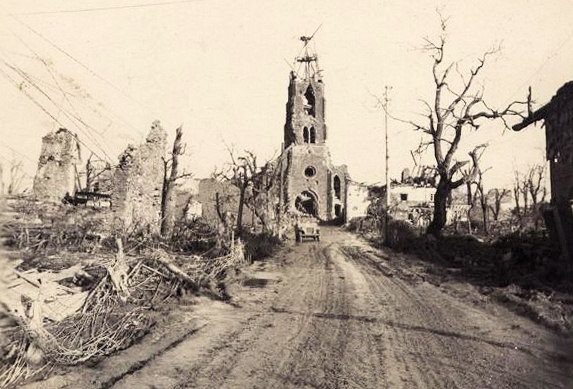
From the curve, the street headed straight town and came to an abrupt in front of the Catholic Church, bearing a sharp left then an immediate right continuing to its end. My estimate, 7 city blocks.
As Point man we headed crouched toward, keeping to the left side of the road where there was a shallow ditch. It became our refuge as the 88's began to rain in again. It surprised me that the only house left standing was the one on the corner. Although slightly damaged, it appeared to have been used recently. We learned later the Germans and the Americans used this place as a medic outpost. But today the building was a shambles. In a crouched position, I ran and fell and ran some more until I reached the curve in the road. Limmie and the rest of the platoon followed close behind, fortunately. Huston and I ended up in a crater hole big enough to protect us somewhat. In this position it was impossible to see what was beyond the curve. We were about to dash across the street when up came a pig squealing and bleeding from a gash on its side. At least he was running in the right direction. (I had to smile at this point, because for a brief second, the tension eased.) Leaving our crater hole, the both of us dashed across the street to get a better look at what we were about to encounter. Unfortunately for Corporal Gailliot, a missile landed so close to the hole we had left and he had occupied, that shrapnel left a gap in his back, from his left rear to his right shoulder. He called for the medic and the medic taped him to stop the bleeding, then found his way back to an aid station.
The worst was yet come minutes later. In the same location a shell hit and obliterated the poor medic. I never even knew his name. Again the shelling stopped and Huston and Lt. Rollins confered, as we were stationed on the main street facing the Church, Co. "A" was ordered to move out to the left of the town and we were to hold their previous positions.
The enemy had control of the Church at point and, after consultation, Sgt. Guidry with 4 or 5 men stormed the Church and held the rear section, but in so doing he lost Pvt. Bishop. He was hit, I believe, with fire from the well known Burp-Gun. The burp gun is not is not a very accurate piece, but at close range it can cough up a lot of nasty venom, making in-fighting very assertive.

MP 40 Submachine Gun
You would think, at time, that those of us who were moving around so much weren't scared. Not so, I shook at time enough to have to get up and walk a few steps just to relieve the tension.
Bishop had cried for several hours hoping someone could help him. It was dark now, but I saw Sgt. Guidry and Huston make several attempts to rescue Bishop but the enemy, having high-beam lanterns, would flash them as soon as anyone moved. They were using Bishop as bait. One must remember that in the dark, when an M-1 is fired, a red flame exhausts from the barrel, giving away ones position. So few shots rang out from out men. In the meantime Huston had Wilson set up a 30 caliber water cooled machine gun in a crater, slightly south of the Church. The emplacement was great, about 20 inches deep and in the center of the road with a stone wall about 4 foot high. To our rear, the burning building cast a shadow over the emplacement blending it with the demolished.
Lt. Schindler had, this time, become our temporary Company Commander. His instructions to Huston were to place three listening posts on or near the road south of the emplacement. I was dropped off first, then some 20 feet away was to be another and so on. My position was at the edge of the grave yard adjacent to the Church, which at one time housed cattle, especially pigs. There were no decent places to take cover, so I stood right next to three remaining timbers. I did notice a small US tank some 50 yards ahead but slightly to my right. It was out of commission, with the track blown off. Apparently it ran over a mine and was obviously empty. The peace and quiet didn't last long, so I thought. Voices coming from places where Huston had previously placed a listening post. How many were there? Boy, this question enveloped my mind. How should I react? Shold I attempt to fire? Should I remain quiet and squeeze my body closer to the timbers and pray they don't see me? The few seconds I had to think and since there was no commotion from the other outpost, I decided to remain quiet. Well, it was not a patrol, just two Germans half-lit and not curious of what was transpiring. They intuitively stayed away because of the nauseating smell. In what seemed like hours, probably minutes, Huston's voice (actually a whisper) summons me to return to the CP.
For the next ten minutes we discussed. We told to begin Co. C's assault at 7:30 AM, the coming morning. However it was Bennett's and my time to cover the 30 caliber. Relieving the other gunners, we squatted uncomfortably low and strained our ears for foreign sounds. Crackling of wood burning is a familiar sound, and the wind whistling through the tombstones is also. Being low in the crater and the moon dancing behind the clouds gave me an eerie feeling. Not to mention, as you sat there, all manner of thoughts go through your head, plus being scared. Who wasn't? The visible tombstones were silhouetted when the moon peaked out of the clouds. And so, we waited.
Not for long. An muffled noise, dragging and scraping very low like a bow streaked across a violin. Patiently we waited. Bennett saw it first and began to rise from his squatting position. I laid my hand on his shoulder as a signal for him to remain until I was ready. Only seconds later a full body came into view creeping on top of the cemetery wall. The moon did us a great favor, It silhouetted the moving figures (would you believe in a tenth of a second, the "wait till you see the whites of their eyes" flashed through my mind. Where have you heard that quote before?) We didn't wait, of course. Simultaneously we fired, I with the 30 and he with his M-1, as they came into view momentarily. The first enemy, a big six foot soldier was dead instantly, the others scrambled out of sight of our line of fire. It was obvious some were injured. Moments passed and mortar shells began falling near the emplacement. Picking up the 30 and Bennett the ammo, we dashed for the opposite side of the wall. Here we took a breather until the shelling stopped.
The opposition tempted Smith and Garrett take pop-shots at the intermittently passing Germans.
They were seen as silhouettes passing by windows diagonally across the road. Almost immediately again the mortar shells rained in on the house we were in. Time was running close, we were about to commence our attack. It was halted for reasons I did not know at the time. The upper Brass had ordered a small tank to help with the assault, and it hadn't arrived yet. Recall I mentioned a small tank was out of order? Well, during the night a tank retriever came and hauled it away. We heard the noise, but really we didn't know what it was.
8:00 o'clock Lt. Rollins signaled to begin; the plan was one platoon was to take each side of the street. We were commissioned to take the Church side; one exception, our squad was divided. I with my own men would flank the first house immediately after the tank blew out the back door with his 75 caliber. We entered the grave yard at the extreme end and very close to where I was positioned that very night. We scaled the two foot wall, crawling between tombstones. Aaaah, Aaaa, came the sound of a German gun emplacement. We fell to the prone position. Everybody had a private tombstone for cover. Not knowing where the gun was located, we laid waiting, popping up every so often trying to sight the nest. Huston had no cover at all except to lay flat on the earth. His group was to scale the wall and line up close to the Church, and then join us as we entered the first house. Thank God for the tank.
One shot from the tank with his 75mm. directly to the covered enemy. They surrendered hurriedly. One even gave himself up during the night to the tanker. Gathering the prisoners quickly the pursuit continued. A blast to the back door and in we went. Firing as we went, I ran completely through the house, firing into each room. Several men scrambled up stairs and found it empty. The enemy proceeded to cross the road to the other side not knowing that the first platoon was in action over there.
Bennett called me excitedly."I think there is someone in the basement", when we were sure, gradually the door to the basement was opened, totally dark and quiet. Bennett again assured us that there was moaning below.
I was born and around multiple ethnic Europeans, listening to these people talk in their own language, it was obvious that some of the sounds would remain in my mind. So, with my broken Deutsch lingo I shouted, " cum arouse mit the han de ho" (pause) " Yaw vol mine her", was the answer, ( The spelling of my German slang is probably wrong, so pronounce as it sounds). I then said " cum lungsome, vier scheechen ze nic", meaning come slowly and we will not shoot you. The voice answered, " Vier hab furwounded herine", we have wounded down here. So little by little each wounded helped each other up the stairs. Huston had each searched as they approached. The very last soldier was the Medic and I proceeded to search him. Found a 7.5 automatic in his bag. A medic carrying a gun, I exploded. WHAM with my fist I struck him on the jaw. He backed off and screamed in German that it was a mercy pistol. How did I feel-low as a snake? Believe me I almost apologized to him for my actions.
By this time the squads had taken the next two houses with the capture of several prisoners. Above, 2 p38's or 37's came diving strafing as they flew bye. We assumed communications was bad, since they were firing into our own area.
Someone from Billy's squad across the street yelled that two Nazi's were hiding in our garage. The only way into the garage was the way they ran in, so up the stairs Bennett and I ran. I remembered that there was an American rocket launcher lying on the floor above the garage. Loaded the bazooka and pulled the trigger; nothing - - someone confiscated the batteries. The next best thing was to drop it through the roof. That we did but it didn't went off, however it scared the enemy so d=bad they took off like an eagle in pursuit. This was funny, both sides of the street were firing at the Germans and nobody scored.
Huston gathered us together. It was our to take the next house. Doing so we entered an empty house. Somehow one gets a slight relief when there is no shooting. We continued leap frogging until about the next to the last house on the street. Please remember that those on the other side of the street came together as we approached the house.
This house became a problem. There were no windows on this side of the house so the enemy was completely concealed. Normally the group would fire into all windows before we charged the buildings. We hesitated momentarily, finally Lt. Rollins nudged me signaling to start the advance. A barn like structure attached to the end of this house was used as a manure storage and other farmer paraphernalia. Being the point man, I went first and no sooner rounding the corner I slipped on my ass. The area was wet and muddy, with manure droppings and indeed slippery. As I fell I could see tracer bullets flying over my head. I rolled over and pretended being dead. Within seconds Huston called, "are you alright?". I didn't answer. Were the Germans close enough to hear my voice? Then he said "Rollins was hit, are you alright?" I muffled a yes. I could see a small hole on the lower side of the building, with the nozzle of the enemy's gun projecting. I relayed that information to Huston and immediately he ordered Smith and others to concentrate their fire towards the small opening. When the enemy gun stopped firing, I rolled over, picked up my muddy M-1, headed for the opening at the right side, and where normally the kitchen would be what I found was an expanded hole where once there was a window. Without slowing down I leaped into the room, landed on my haunches pointing my rifle and shouting in my very best German to surrender. The presence of my men behind me was very reassuring, especially when in walks another enemy from across the street. Seeing Bennett's rifle pointed at his face, he stood there in shock for a brief second, then dropped his weapon instantly. I began to wipe the mud from my M-1 when I noticed that the clip did not eject. Me, standing there with an empty rifle. I searched my belt but in vain, No ammo. I proceed to ask for a clip, but no one had any to spare. Cursing, I demanded at least give one shell. At that, someone responded.
We herded the into one room. The next squad leaped ahead. Not being positive, but in the next house the enemy surrendered without firing a shot. This being the last house on both sides of the street, we were pleased to take a rest.
Lt. Meiers gathered prisoners and assigned a few men to escort them back to the CP. Some time later Lt. Meiers decided to return to the CP to send back ammo and some of the men who left as guards. Our physical count was eight men on the left side including Meiers. On the right side, seven of us minus an Officer, and very low on ammo. I don't know who made the decision to burn the lonely house, about 50 or 60 yards off to the right, but it lighted the whole area giving us visible access to approximately a hundred yards in all directions. If at this time the enemy should counter attack, we would be doomed.
Since we were discussing how little ammo we had, Wilson suggested we go back and pick up our 30 caliber. There were no volunteers, so I chose to go with him being assured he knew where he dropped it. "In the grave yard" he said, when we were pinned down. Where else, 000 shelled by mortar. This time we were definitely the target. As we ran the shells were bursting in the rear of us and gaining.
Again I counted, we had entered when we definitely had to find cover. Wilson dove behind a large tombstone and I hit the trough in the pig pen, the place where I had been twice before. Believe me, the tenth volley did not explode, and I thank God for that. We very well could have been mangled, it was that close.
Picking up the 30 cal, Wilson took the two boxes of ammo. We started back and again I thank God for the shelling was on the other side of the street, giving us freedom to run. No sooner we arrived, Wilson set up the 30, in the center of the road and Huston assigned two others to man the gun.
As I entered the house I noticed Sgt. Donald Gray had come to take the Officer's position and with him he brought -- bandoliers, one of which he slung over my shoulder immediately. Then I sat down to clean my rifle. I was tired, so I sat in a corner with a rag I found and slowly removed the caked grime from my clothes. The pig trough I found was full of worms and maggots, not to mention I stunk from the wet manure I fell in.
Shortly, one could hear a shouting, one instantly jerks up to see what's up. The voice of Huston called "hold your fire". Although I couldn't see it, but an enemy soldier carrying a white piece of cloth wanted to surrender. His language was unfamiliar, so I was summoned. He talked so fast I could hardly make out his lingo. It was Polish. I raised my hand and he stopped talking. I then said to him in Polish that " I don't speak Polish", ( na resummish polaski). That's the limit of my Polish, except I can sing and dance to Polish music. To make a long story short, he tells me when the Germans took over Poland he, being in the army, they drafted him into the German army. Sgt. Guidry ordered a fellow I know only as Katz, to escort the prisoner back to the CP. This was the last we heard of Katz. He was listed as missing in action. We don't know what happened to him.
Finally relief came, and as I looked at the fresh soldiers I assumed they just came over from the USA nice and clean, pressed clothes, shiny rifle, etc. Walking back to the main part of town to board the trucks, I picked up a small part of what used to be the pipe organ of the Church. This I hoped to be a souvenier from this engagement.
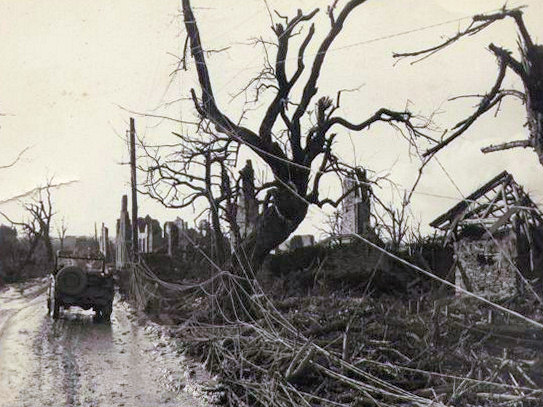
Back in camp (we were staying in pup tents) I undressed and piled my clothes into one bundle and threw them on a pile some distance from our tent (they stunk rancid). Slept lightly that night. Next morning, no work. I filled my helmet with hot water and, along with many others, took a sponge bath. Visiting the supply Sgt., I asked for new clothing. He only had the duffle bags of the men killed in action, but he found me another pair of pants. We spent most of the day just moseying around. In the evening after dinner, Sgt. Tubbs and I were called to the CP and were informed we were to lay a mine field, west of the town which we had just left. Sgt. Tubbs was to be in charge and I was to recruit three men from my squad to act as out line security. This task I found was to be a very dangerous patrol. We were to position ourselves between the minefield and the wooded area where the enemy was assumed to be hiding. This was all open space. We were sitting ducks if a sharp shooter lurked in the woods. However, the laying of the minefield was interrupted about fifteen minutes after we started. The Germans began shelling with those well known 88's. As soon as the first couple of shots went over our heads, Tubbs gave the order to get the hell out of there. We all scrambled for the truck that was only a block away. The truck had only gone about seven blocks (center of town) when the shelling stopped. The truck stopped also. I heard the door opening and knew Tubbs was coming to the rear. (I am thinking to myself, I hope he doesn't decide to go back and continue laying the mine field). His reason for stopping was to head count to make sure we left nobody behind.
We returned to camp with a job undone. The next evening another group of engineers were chosen to return to the same area and completed laying of the mine field. According to Sgt. Paul Gray, no incidents occurred.
April 12, 1921 - † December 28, 2011
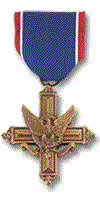
Distinguished Service Cross
Awarded for actions during the World War II
The President of the United States of America, authorized by Act of Congress, July 9, 1918, takes pleasure in presenting the Distinguished Service Cross to Corporal [then Private First Class] Henry J. Kalinowsky (ASN: 35789411), United States Army, for extraordinary heroism in connection with military operations against an armed enemy while serving with the 146th Engineer Combat Battalion, in action against enemy forces on 7 November 1944, in Germany. During an attack upon the village of Vossonack, Corporal Kalinowsky observed five Germans armed with machine pistols, enter a building and fire upon his platoon, halting the advance. Although he had expended his supply of ammunition, Corporal Kalinowsky, disregarding enemy artillery and small arms fire, ran across an open field and, with great personal courage, jumped through a window into the room occupied by the Germans. Overtaking the enemy by his surprise action, he forcefully demanded their surrender at the point of his empty rifle. The Germans yielded to this valiant soldier, thus enabling his platoon to continue its advance. Corporal Kalinowsky's intrepid actions, personal bravery and zealous devotion to duty exemplify the highest traditions of the military forces of the United States and reflect great credit upon himself, his unit, and the United States Army.
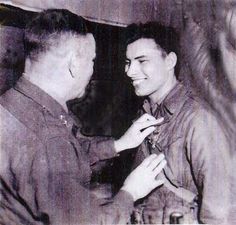 General Orders: Headquarters, First U.S. Army, General Orders No. 100 (December 23, 1944)
General Orders: Headquarters, First U.S. Army, General Orders No. 100 (December 23, 1944)
Action Date: 7-Nov-44
Service: Army
Rank: Corporal
Battalion: 146th Engineer Combat Battalion

Source: Former website of the 146th ECB (http://www.146thecbwwii.org/) maintained by Lenny Fox.
Please also read the personal account of Carroll Guidry.
